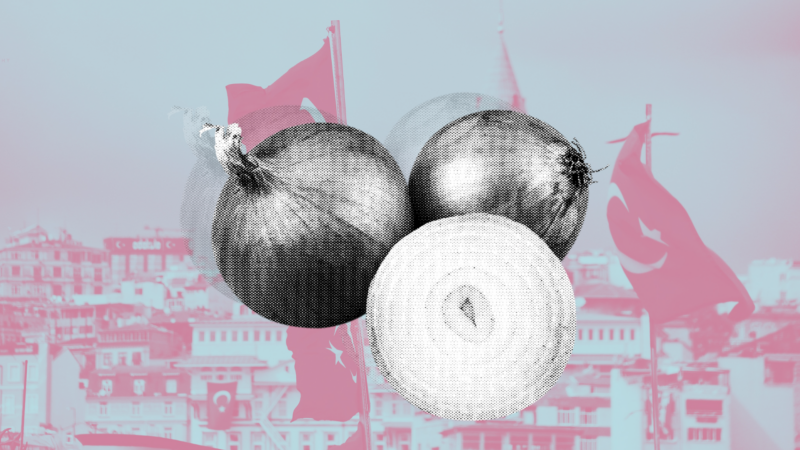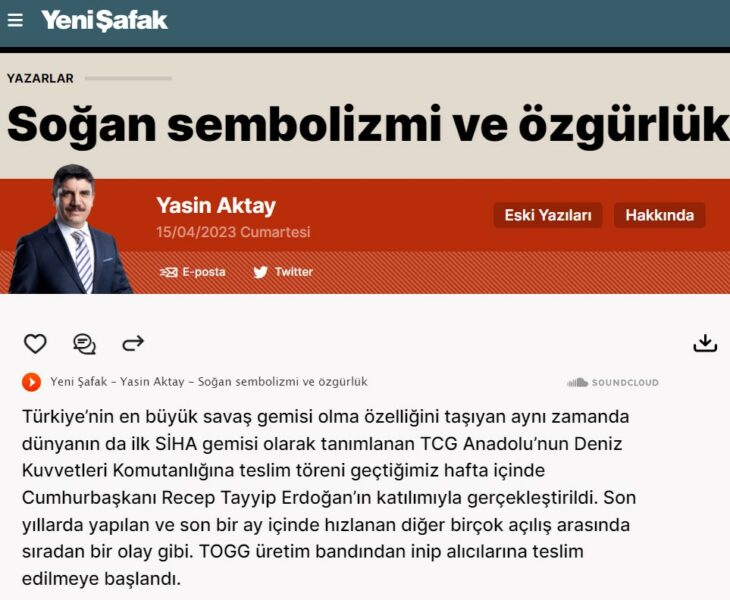What a viral post by a Turkish food critic tells us about the country's upcoming elections
Originally published on Global Voices

Illustration by the Civic Media Observatory
This story is part of Undertones, Global Voices’ Civic Media Observatory‘s newsletter. Subscribe to Undertones.
Turkey is headed for general elections scheduled for May 14, 2023 amidst important campaigning narratives. Sencer Odabaşi, a Turkish researcher from Global Voices’ Civic Media Observatory, will guide us through the most important pre-electoral narratives at play to understand how Turkey's citizens are perceiving these elections.
Today, millions of Turkish citizens who want Erdoğan out – about 53 percent of the population, according to recent polls – are hopeful and nervous.
Hopeful, because if the opposition wins, they believe democracy has a chance to be restored, along with the economy. Nervous, because if Erdoğan and Justice and Development Party (AKP for its acronym in Turkish) win, “it may be Turkey’s last elections, given how increasingly authoritarian the president has become.”
No one truly knows who will win. Most polls show tight results between the candidates, and historically, most polling companies failed to predict the results in past elections.
Turkish citizens are still reeling from this year’s devastating earthquakes and skyrocketing inflation. In this taut context, some everyday items have been elevated to a status symbol. Onions, prayer rugs, and cars are on that list.
On the side of Erdoğan’s critics
“The inflation and currency crises are out of control”
This narrative in a nutshell: “No one can afford anything anymore, and it’s because of the government’s corruption”
The poor management of the Turkish economy is the opposition’s main argument against the ruling party. Inflation in Turkey reached nearly 100 percent in 2022 and is now at 60 percent. In everyday terms, people are struggling to pay rent and buy food. “The middle class disappeared in Turkey,” Odabaşi says, and malnutrition is becoming a threat, according to opposition figures.
The main opposition bloc – led by Kemal Kılıçdaroğlu and his diverse “Millet” coalition – claims that the economy is suffering because of corruption and bad overall economic management. Since the Millet coalition gathers politicians of different stripes who do not fully agree on economic solutions, their main argument is that democracy must be restored in order to give a chance to meritocracy, and as a result, the economy. One of their main campaign promises is to give back power to lawmakers, who lost their leverage when Turkey embraced a presidential system in 2016.
Today, even complaining about the price of onions can be “seen as an act of defiance” by the government, according to Odabaşi. By lamenting about the challenges of living in a hugely inflationary economy, citizens earn the wrath of the government, which blames them for being ungrateful.
An example of how this narrative spreads online: “What is the first thing that comes to mind when you see this photo?”
 Where it is shared: Twitter
Where it is shared: Twitter
Author: Vedat Milor, a Turkish scholar, gourmet, wine sommelier, and celebrity.
Content: Milor shared a photo from a supermarket showing that a kilo of onions is being sold for 26,49 TL (1.36 USD). In the caption, he asks, “What is the first thing that comes to mind when you see this photo?”
Context: The price of onions has increased ninefold since December 2021. Onions, a staple in Turkish cuisine and generally considered the cheapest option to find in a grocery store, are now increasingly costly. There are even proverbs in Turkish about eating onions and bread to refer to poverty.
Subtext: Milor received backlash for speaking about politics instead of food recently. He shared this image as a response to the backlash.
Civic Impact: +2 out of +3, because a celebrity food critic speaking up about nutritional issues of popular classes is rare and has a positive civic impact.
See this item’s complete analysis here.
Other developing narratives:
- “Erdoğan is willing to use all means necessary to win the elections”
- “Erdoğan’s ‘Cumhur’ alliance is a radical right-wing alliance”
- “The government's response to the earthquake has been insufficient and inadequate”
On Erdoğan’s side
“National and religious identities are more important than basic livelihoods”
This narrative in a nutshell: “Are you going to sell your religion and identity for a bunch of onions?”
Erdoğan’s government bloc is losing support from its core electorate, Odabaşi says, due to the mismanagement of the earthquake relief and the economic crisis. To counter this, Erdoğan’s main campaign strategy is to galvanize nationalist sentiment.
According to Odabaşi, Erdoğan is pitting “identity” versus “reality”. Religious and national identities are highlighted while everyday economic realities are ignored.
“The strategy to consolidate Erdoğan's voter base seems to be hinged on convincing voters that they are part of a culture war,” Odabaşi says. “Erdoğan doesn’t have much else to talk about.” Erdoğan’s people imply that anyone who criticizes the government for economic reasons is not a proud Turkish citizen.
This tactic might work for some. “If you keep telling people that their identity is in danger, it might influence the results,” Odabaşi reminds us.
This narrative is used for religious and national identities. For example, a series of photos made the rounds online, showing the opposition alliance's presidential candidate Kılıçdaroğlu stepping on a prayer mat. Even though Islamic scholars assert that a prayer mat is not a holy object, Erdoğan and his party have made it a talking point by emphasizing Kılıçdaroğlu’s “disdain for Islamic symbols.” Odabaşi analyzed such a talking point here, which also promotes the narrative that “the main opposition party is Islamophobic.”
Turkey has also started producing of its own car, the “TOGG,” and recently built a new aircraft carrier, TCG Anadolu. These have become symbols of Turkey’s grandeur in Erdoğan’s speeches. “The narrative is not about creating jobs,” Odabaşi says, “but rather that ‘we are a great country that can produce cars. Why are they bothering us with onions and potatoes?’ ”
An example of how this narrative spreads online: “Onion symbolism and freedom”
 Where it is shared: Yeni Şafak, a news outlet known to be close to the AKP and Erdoğan
Where it is shared: Yeni Şafak, a news outlet known to be close to the AKP and Erdoğan
Author: Yasin Aktay, one of Erdoğan's closest advisors and Islamist academic
Content: Aktay, in a sermon-like tone, calls people complaining about onion prices “spoiled”. He writes: “People who have been granted freedom can forget all the bad, destructive, humiliating aspects of the days when they were slaves” and “onions are an expression of nostalgia.”
Context: same as previous item
Subtext: The freedom Aktay talks about may refer to the Turkish Islamist understanding of history which claims that the Turkish Republic oppressed the country’s Sunni conservative majority until the AKP “freed” them. Aktay may also refer to Erdoğan's narratives about foreign policy, which would be “free” from Western influence.
Civic Impact: -2 out of -3, because it is untied to the reality of the people, insulting a whole society for demanding better living conditions.
See this item’s complete analysis here.
Other developing narratives:
- “The main opposition party (the CHP) is Islamophobic”
- “The leftist/Kurdish movement (the HDP) is the secret seventh member of the ‘table of six'”
Post a Comment